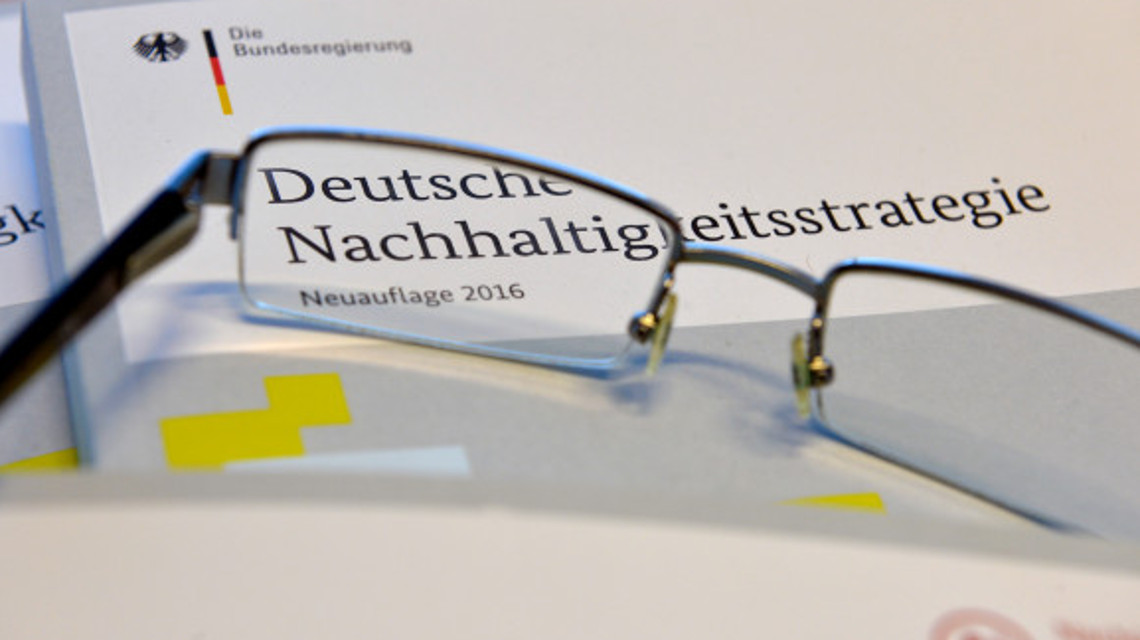Outlining national sustainability
The German Federal Government has approved a "German Strategy for Sustainability". It outlines how the sustainable development goals are to be achieved.

Fifteen years after the first edition of the Sustainability Strategy was released, the Federal Government has unveiled a new version in the form of the "German Sustainability Strategy" (DNS). The document, which falls just short of 260 pages, details measures to boost sustainable development across the full breadth of society with an eye to achieving concrete goals. "It calls for nothing less than to live in dignity, justice and peace, for social security, as well as for the opportunity to develop economically while also protecting our natural livelihood", says Federal Chancellor Angela Merkel.
New guidance reflects UN Agenda
The new national guidance fully reflects the spirit of Agenda 2030, which was adopted by the United Nations (UN) in New York in 2015. The 17 goals listed in the global action plan address the key global challenges over the next 15 years and serve as a guide to all of the world's nations. Thus, all 17 of the SDGs (Sustainable Development Goals) defined by the UN have been incorporated and firmed up in the 2016 Sustainability Strategy. The goals relate to the fight against poverty, food security and healthcare, as well as education, gender equality, the rule of law, climate and species protection, sustainable consumption and economic development. Targets capable of being achieved by 2030 have been laid down for each individual goal. The significance of the bio-economy for implementation of the global sustainability goals has been emphasised on several occasions already. An expert board involving the German Bio-economy Council recently highlighted as much in the scientific magazine Nature.
Goals and progress indicators extended
With the new national sustainability strategy, which presents a revised version of the strategy published in 2002, the German Federal Government has greatly extended its existing targets. The new vision has adopted 13 additional subject areas and 30 progress indicators. The new goals listed, which include sustainable consumption and production, will be tested using three measures: the market share of products boasting a Federal eco-label; Co2-consumption; and the number of companies involved in EMAS (Eco-Management and Audit Scheme).The issue of distributive justice has been codified for the first time, with a recognised indicator based on the Gini coefficient. Going forward, standards of governance will also be measured using the Transparency Corruption Perception Index.
Weather symbols for the current climate
The German Sustainability Strategy is the first report clearly to lay out current progress on the planned sustainability developments. To that end, a new system of indicators using four well-known weather-forecasting symbols is being used. Thus the "sun" symbol indicates that the goal has almost been achieved, while "storm clouds" show that the trend is in the wrong direction. The new suite of 63 progress indicators and their accompanying targets allow developmental progress to be monitored objectively and in a specific manner. At the moment, the overview of developments is displaying 21 suns and nine storm clouds. The current trend for indicators showing nitrate pollution in groundwater, energy consumption and related Co2 emissions, as well as species diversity and the quality of the environment, has been ranked as very poor. In contrast, developments in sustainable land use, improving economic performance, rising employment, and the development of renewable energy are positive. According to the new paper, "Adopting the key principle of sustainability as a guide is a driver of increased prosperity and growth, and an opportunity for the economy to tap into new methods of adding value."
The draft was discussed for several months. Last summer, the Council focused on the paper at its annual conference on sustainable development in Berlin. As a consequence, the strategy is the result of numerous opinions garnered by the Government during the 18-month period of debate, which involved ordinary citizens as well as associations and institutes. "We will show that material prosperity, social solidarity and environmental protection can and must go hand in hand," said Peter Altmaier, Director of the Federal Chancellery, to mark the adoption of the new German Sustainability Strategy.


